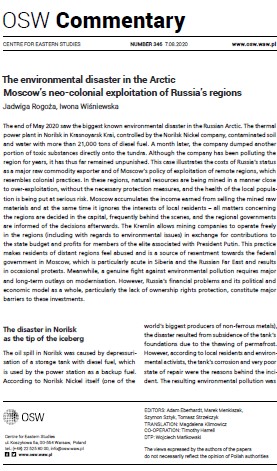The environmental disaster in the Arctic. Moscow’s neo-colonial exploitation of Russia’s regions
The environmental disaster in the Arctic. Moscow’s neo-colonial exploitation of Russia’s regions
Author(s): Iwona Wiśniewska, Jadwiga Rogoża
Subject(s): Energy and Environmental Studies, Environmental and Energy policy, Government/Political systems
Published by: OSW Ośrodek Studiów Wschodnich im. Marka Karpia
Keywords: environmental disaster; Arctic; Russia; Norilsk; environmental issues;
Summary/Abstract: The end of May 2020 saw the biggest known environmental disaster in the Russian Arctic. The thermal power plant in Norilsk in Krasnoyarsk Krai, controlled by the Norilsk Nickel company, contaminated soil and water with more than 21,000 tons of diesel fuel. A month later, the company dumped another portion of toxic substances directly onto the tundra. Although the company has been polluting the region for years, it has thus far remained unpunished. This case illustrates the costs of Russia’s status as a major raw commodity exporter and of Moscow’s policy of exploitation of remote regions, which resembles colonial practices. In these regions, natural resources are being mined in a manner close to over-exploitation, without the necessary protection measures, and the health of the local population is being put at serious risk. Moscow accumulates the income earned from selling the mined raw materials and at the same time it ignores the interests of local residents – all matters concerning the regions are decided in the capital, frequently behind the scenes, and the regional governments are informed of the decisions afterwards. The Kremlin allows mining companies to operate freely in the regions (including with regards to environmental issues) in exchange for contributions to the state budget and profits for members of the elite associated with President Putin.
Series: OSW Commentary
- Page Count: 6
- Publication Year: 2020
- Language: English
- Content File-PDF

